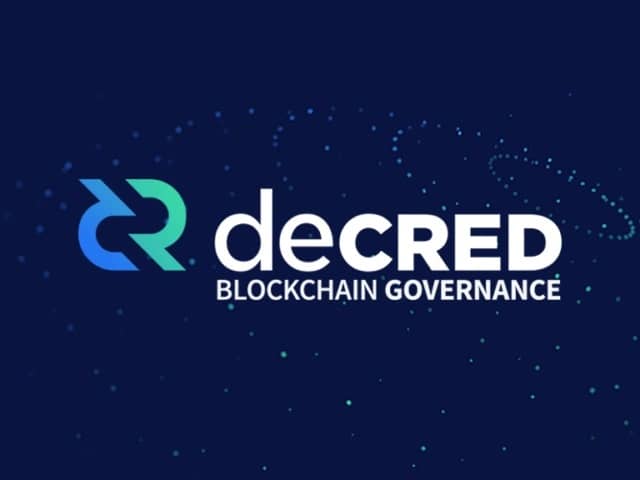위키 구독하기
Share wiki
Bookmark
Decred
0%
Decred
Decred( /ˈdi:ˈkred/, /dɪˈkred/, 디크레드)는 오픈 소스, 커뮤니티 기반 암호화폐로, 비트코인과 유사합니다[1].
개요
Decred는 비트코인 개발자들이 btcsuite[3]를 엔지니어링하여 2016년 2월에 출시되었습니다[2]. btcsuite는 Go(golang) 프로그래밍 언어로 작성된 대체 풀 노드 비트코인 구현체이며, 이더리움, Factom, BitGo, OpenBazaar 및 라이트닝 네트워크와 같은 개발 프로젝트에서 사용됩니다[4].
블록체인 아키텍처
Decred는 비트코인 시스템 내에 존재하는 중앙 집중화 및 거버넌스 충돌을 해결하고[6] 분산형 암호화폐 내에서 발생할 수 있는 '공유지의 비극'을 해결하기 위해 내장된 거버넌스 시스템으로 설계되었습니다[5].
Decred의 거버넌스 시스템은 하이브리드화된 작업 증명(PoW) 및 지분 증명(PoS) 합의 프로토콜로 엔지니어링되었습니다[8]. 이 디자인은 2013년에 발표된 MEMCOIN2: 하이브리드 작업 증명, 지분 증명 암호화폐 [7][9] 기술 논문과 2014년에 발표된 작업 증명 없는 암호화폐 백서를 기반으로 합니다.
해시 함수
Decred는 BLAKE-256을 해시 함수로 사용합니다. BLAKE-256은 Daniel J. Bernstein의 ChaCha 스트림 암호 변형을 통합하는 HAIFA 구성을 기반으로 합니다. BLAKE-256 해싱 함수는 x86-64 마이크로아키텍처에서 높은 성능 등급을 가지고 있습니다[10].
활동 증명
하이브리드 작업 증명 및 지분 증명 시스템은 활동 증명(PoA)이라고도 합니다. PoA는 Litecoin 창립자 Charlie Lee가 공동 저술한 활동 증명: 지분 증명을 통해 비트코인의 작업 증명 확장 백서[11]에서 소개된 합의 프로토콜입니다.
역사
2016
2월 7일: Decred 메인넷 바이너리가 v0.0.1로 릴리스되었습니다[13].
2017
4월 25일: Decred v1.0.0이 릴리스되었습니다[12].
9월: Decred 개발자는 Decred(DCR)와 라이트코인(LTC) 간에 아토믹 스왑을 실행했습니다[14][15].
토큰노믹스

Decred 토큰($DCR)
토큰 유틸리티
Decred의 기본 암호화폐인 $DCR은 네트워크 내에서 교환 매개체 및 가치 저장소 역할을 합니다. 이는 P2P 결제를 용이하게 하고 사용자가 스테이킹을 통해 네트워크의 거버넌스에 참여할 수 있도록 합니다.
$DCR을 스테이킹함으로써 사용자는 티켓을 받습니다. 티켓은 지분 증명(PoS) 합의 메커니즘 및 거버넌스 프로세스에 참여하는 데 사용되는 양도 불가능한 암호화 자산입니다. 각 블록에서 5개의 티켓이 포아송 분포를 사용하여 작업 증명(PoW) 채굴자가 생성한 블록을 검증하고 지정된 투표 기간 동안 거버넌스 제안에 투표하기 위해 선택됩니다. [16]
토큰 배포
출시 시 총 2,100만 $DCR 공급량의 8%(168만 DCR)가 사전 채굴되어 다음과 같이 배포되었습니다.
- **50%**는 창립 조직인 Company 0(36%)과 Decred 개발 팀(14%)에 할당되었습니다. Company 0은 DCR을 24개월 동안 거래하지 않기로 약속했으며, 개발 팀의 할당량은 12개월 동안 잠겨 있었습니다.
- **50%**는 적격 참가자에게 에어드롭을 통해 배포되었으며, 최대 참가자 수는 5,000명으로 제한되었습니다. 프로젝트 기여자에게 우선권이 주어졌습니다. 나머지 공급량 나머지 1,932만 DCR은 Decred의 정의된 인플레이션 일정에 따라 채굴을 통해 발행됩니다. 이 프로세스는 최종 블록 보상이 발행될 때까지 계속되며, 2039년 1월로 예상됩니다. [16]
잘못된 내용이 있나요?
